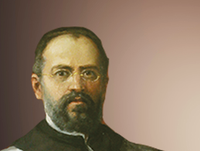Vittorio Puntoni was the University’s first 20th century rector and, indeed, its longest serving. In his two terms, he governed the University of Bologna for no less than 21 years, ferrying it, with his practical and diplomatic skills, into the modern world.
 Vittorio Puntoni was born in Pisa in 1859 to a family of humble origins.
Vittorio Puntoni was born in Pisa in 1859 to a family of humble origins.
He graduated in Literature from the Scuola Normale Superiore in 1881. His thesis supervisor, Enea Piccolomini, one of the earliest exponents of formal philology, kept him by his side for eight years at the Gori-Feroni Institute of Oriental Studies in Siena, where Puntoni learned Coptic, Hebrew and Arabic.
In 1884 he became a free lecturer in Pisa and four years later, in 1888, he moved to Messina to teach Greek Literature and Comparative History of Classical and Neo-Latin Languages. From 1890 to 1892, he was a temporary professor of Greek Literature in Palermo and then took up a permanent post, from 1892 to 1926, at the University of Bologna, again as professor of Greek Literature.
Only four years after his arrival, he was elected rector, a position he held until 1911, thus becoming the University’s first rector in the 20th century. The University of Bologna had not yet managed to modernise itself adequately, and even though Puntoni's predecessors, particularly Capellini and Murri, had attempted to upgrade the university structures during the overall reorganisation of the city, there had been no adequate political and economic support for this undertaking. With the support in the Chamber of Deputies of Enrico Panzacchi, the prestige of the newly-elected Nobel Prize winner Carducci and the Minister of Education, the Imola-born Giovanni Codronchi, Puntoni succeeded in implementing the first plan to expand the academic buildings on the new Via Irnerio, also planning the subsequent enlargement of the university citadel behind the central seat of Palazzo Poggi, through the second convention between the University, local authorities and the State in 1910.
Despite the fact that his aspirations focused more on research, in 1917 he was re-elected rector until 1923, precisely because of his being a 'practical genius', as Carducci himself recalled.
During these long years as rector and professor in Bologna, Puntoni also held important political and institutional positions. He was: town councillor (from 1899); senator of the Kingdom of Italy (from 1922); member of the Royal Commission for the reform of secondary schools, of the Higher Council of Public Education (1905-09, 1913-17) and of the Royal Council (1907-09, 1915-17); and member of the Accademia dei Lincei and of the Accademia delle Scienze in Bologna (1907), of which he was president of the Class of Moral Sciences (1912), added on the occasion of Carducci's Nobel Prize.
His service and the prestige he achieved earned him decorations from multiple orders and, of course, the honorary citizenship of Bologna (1911).
The philological specialisation of his linguistic investigations as a Greek and Byzantine scholar, open to Orientalism and a leading exponent of Philhellenism, did not distract him from his pedagogical and practical vocation, so much so that he was also highly appreciated for his scholarly works.
When he died in Rome in 1926, Bologna celebrated him with a solemn funeral. His body was displayed in the Bulgari Chapel in the Archiginnasio and finally buried in the Certosa di Bologna.
